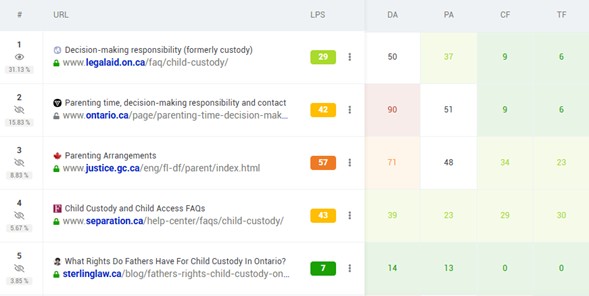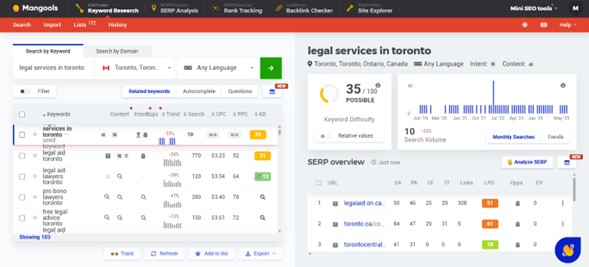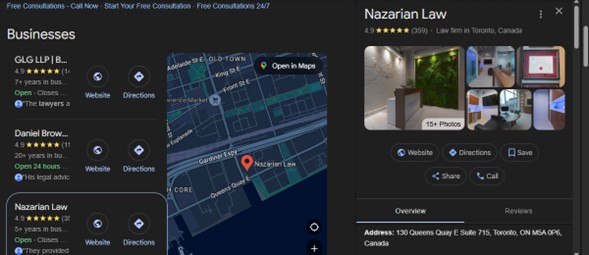Are family lawyers capturing every online opportunity, or is there untapped potential?
Harnessing the power of SEO can set you apart in the competitive legal landscape and stop you from leaving money on the table.
This guide zeroes in on the unique challenges you face, offering precise strategies from on-page tweaks to content creation. Discover how local SEO can amplify your reach, why Google My Business is crucial, the art of link-building tailored for your niche, and more.
Ready to elevate your practice? Let’s dive in.
What exactly is family law SEO?

Family law SEO is the art of optimizing a family lawyer’s online presence to attract potential clients.
Through specific techniques—like keyword targeting and content creation—it ensures that when someone searches for family law services, your practice appears prominently in search results.
Why is SEO important for family lawyers?
In today’s digital age, most people turn to search engines for legal advice and services. If your family law practice isn’t optimized for search, you’re missing out on a significant number of potential clients.
Here’s why SEO is pivotal for family lawyers:
- Client Acquisition: Every day, thousands search for terms like “divorce attorney” or “child custody rights”. With effective SEO, your firm can be their first click, leading to higher client acquisition rates.
- Staying Ahead in Competitive Markets: In bustling cities, there are numerous family lawyers vying for the same client base. SEO ensures you’re not lost in the crowd and instead, stand out as a top choice for those in need.
Example:
If we search for “Child custody rights” from Toronto we, rightly, get an official government website in the top position.
Position two is also taken by a government website.
But position five is taken by a Canadian law firm. This is a highly competitive keyword and is a testament to the excellent SEO of the company.

SERP results as viewed on SERP Analysis tool in Mangools
- Building Trust: High search engine rankings signal trustworthiness to potential clients. When they see your firm at or near the top, they’re more likely to believe you’re the best in the business.
- Cost-Effective Marketing: While traditional advertising can be expensive and its results are fleeting, SEO offers a more sustainable and cost-effective way to market your services. Once you rank high, maintaining that position requires less effort than constantly paying for ads.
- Targeted Traffic: SEO doesn’t just bring more traffic—it brings the right kind of traffic. People searching for family law services have a clear intent, making them more likely to convert into clients.
Must haves on your SEO family law strategy
A family law SEO strategy can be comprised of different elements and ideally strives to tackle the matter from different fronts. Although there are many paths you can follow and all will likely guarantee some level of success, here are our professional recommendations as to which specific aspects you should prioritize to ensure you are using your available resources as wisely as possible:
On-page SEO for lawyers
On-page SEO is the process of optimizing individual web pages to rank higher in search results. For family lawyers, this is crucial: when someone is going through a divorce or seeking custody rights, they turn to search engines for guidance.
Your website needs to be there, offering clear, concise, and helpful information. To ensure that, you need a solid on-page SEO strategy that takes into account your website as a whole, the messaging you want to convey, your services, branding, and more.
But, where should you start?
Family law keywords

(Source 1)
Keyword research is the backbone of on-page SEO. It’s about understanding what potential clients type into search engines when seeking legal assistance.
Here’s how to nail it for family law SEO:
- Research: Use tools like Ahrefs to uncover popular search terms related to family law. This helps you understand what your potential clients are looking for.
- Application: Once you’ve identified these terms, integrate them naturally into your content. For instance, if “child custody rights in California” is a frequent search, ensure it’s present in your content.
- Diversification: Don’t just focus on the most popular terms. Terms like “alimony laws in Texas” might have fewer searches but can bring in a niche audience.
Examples of family law keywords:
- Child Support: Terms like “child support calculations” or “child support guidelines” can be crucial for parents trying to understand their financial obligations.
- Divorce Proceedings: Keywords such as “divorce process steps” or “assets division during divorce” can guide individuals through the complexities of a divorce.
- Custody Battles: Phrases like “joint custody criteria” or “primary custody factors” can be invaluable for parents navigating the custody process.
Keywords are the backbone of your family law SEO. They’re the engine that will drive your website to page one, but there is also a science to them.
There are a few SEO tools you can use to research and find the appropriate keywords for your family law firm. Although there are some free options, we recommend trying a paid option in order to get the best results. For example, you could use Ahrefs and learn it by trial and error.
However, your time is probably best spent on other areas of your law firm you’re passionate about.
It might be better to let the experts handle your keyword research and give your clients the time they deserve.
Content marketing for lawyers

For family law attorneys, content marketing is more than just words on a page. It’s a strategic approach to connect with those in need, offering guidance during challenging times.
Crafting vs. Refining:
Starting a blog section allows attorneys to address current legal trends and concerns, ensuring they provide relevant content tailored to the most recent search queries.
By focusing on high-quality content that delves deep into specific legal practices, lawyers can position themselves as authoritative figures, offering informative content that potential clients seek.
This not only boosts search engine visibility but also increases organic traffic from search engines, solidifying the firm’s reputation and expertise in the digital realm.
If you already have a blog section or some form of written communication with your audience but it’s not yielding the desired results, it might be time to optimize it. If this is the case, we recommend you consider:
- Is the content clear and free of errors?
- Does it read naturally and not forced?
- Are heading tags (h1, h2, h3) used for structure and readability?
- Is the title tag concise, under 55 characters, and inclusive of target keywords?
- Does the meta description give a clear overview and prompt action?
- Have images been given appropriate alt text?
- Is there a high-quality image at least every 500 words, making the content visually appealing and scannable?
- Are there some bullet points to keep the reader engaged?
Content Strategy Essentials:
- Audience Insight: Understand the challenges your potential clients face. Are they looking for advice on prenuptial agreements or understanding the intricacies of alimony settlements?
- Content Types: Prioritize informative articles that answer common questions. For instance, a detailed piece on the steps to take after deciding to file for divorce can be invaluable for someone in that situation.
- Placement: While your website should house detailed articles, use social media channels for bite-sized advice, quick tips, or sharing client testimonials. Legal directories can also enhance your online visibility, directing prospective clients your way.
Google’s YMYL Rules & Legal Content:

Google emphasizes accuracy, especially in sectors like Finance, Medical queries, and Law. So, ensure your content is up-to-date and backed by current legal standards.
Remember: misinformation can harm both your reputation and ranking factor.
More Actionable Steps:
- Keyword Integration: Now that you have your keyword list, naturally integrate them into your content to improve organic traffic.
- Engage with Queries: Use your blog posts to answer common questions. If your research concludes that many people are asking about the divorce process, craft a step-by-step guide to answer their questions directly.
- Feedback Loop: Encourage feedback on your content from your legal peers. It aids in refining and understanding what your audience truly seeks.
In essence, a solid content strategy for family law attorneys is about meeting potential clients when they search for you, offering clarity, and guiding them through their legal journey.
Local SEO for lawyers
Local SEO is about making your law firm visible to those in your immediate area searching for legal services.
Imagine someone in your city typing “divorce lawyers near me” or “legal services in [City Name]”; ideally, your firm should be at the forefront of these searches. To achieve that, your website must be optimized to meet those local needs.
Optimizing your site for local search requires a keen understanding of search intent. When potential clients search, they often have specific needs like understanding alimony laws in their state or seeking mediation services.

Example of keyword research in KWFinder tool in Mangools
By incorporating relevant keywords and long-tail keywords into your content, you cater directly to these queries.
Pro tip: Long-tail local keywords are especially recommended for brand-new sites because Google will take a while to rank you for competitive keywords. For example:
- “Divorce lawyers in Toronto” will be too competitive for a new site to get in the good graces of Google.
- But “Prenuptial agreement considerations for high-net-worth couples in Toronto”? Now that’s something your site could rank for early in its infancy.
Google Analytics can also provide insights into the search volume and user experience of visitors to your site.
This data can guide your SEO efforts, ensuring that your digital marketing strategy aligns with local search trends.
Remember, overall the goal is to match your services with the organic search engine results that prospective clients are searching for.
Google My Business for lawyers
For family lawyers, having a Google business profile is a crucial tool in their digital arsenal.
Here’s why:
- Credibility Through Reviews: GMB positive reviews can significantly elevate a family lawyer’s reputation. When individuals seek legal counsel, especially in sensitive matters like divorce or child custody, they often turn to these reviews to assess a lawyer’s competence and empathy.
- Local Visibility: A well-optimized GMB profile ensures that a family law firm appears prominently in local searches, connecting them with community members in need of their expertise.
- SEO Advantage: Regular updates and genuine client reviews on GMB can enhance a firm’s online visibility, making it a top choice in local search results.
- Immediate Contact: The “Call” button on GMB profiles offers potential clients a direct line to the firm, facilitating swift consultations.
Example: Nazarian Law Google My Business
So, if you don’t already have a GMB profile, creating one is a quick step you can take towards a better and more established online presence for your law firm. In order for it to be optimized, fill every available space with your law firm’s updated information, use relevant images of your company and staff, and if possible ask your clients to leave positive reviews of your services.
Technical SEO for family lawyers

Technical SEO is like building the foundation of a sturdy house. For family lawyers, it’s ensuring your digital “home” won’t collapse further down the line.
- Ever clicked on a link that led nowhere? Broken links are frustrating for clients and a red flag for search engines. Fixing them smoothens the journey for everyone.
- Nobody likes waiting, especially potential clients. So speeding up your site’s load time can be the difference between a new client and a lost opportunity.
- And since many clients are searching on their phones, a mobile-optimized site isn’t just nice—it’s essential.
- By nailing these technical details, family law firms can stand out and – most importantly – get the right kind of attention from Google.
Family law website analysis
For family law lawyers, a website is often the first impression potential clients get. Ensuring it’s in top shape can make the difference between a new client and a missed opportunity.
- Website Audit: Use online tools like Google Analytics to analyze traffic patterns, bounce rates, and conversion rates. This helps identify areas needing improvement.
- User Experience (UX): Check for broken links, slow-loading pages, and mobile responsiveness. Improving these aspects can enhance user satisfaction and reduce bounce rates.
You can use free tools like Ahrefs’ Webmaster Tools as a good starting point, however, we do recommend you invest on paid tools for more accurate results.

(Source 2)
- Content Quality: Regularly update your content. Ensure it’s relevant to current legal practices, and answers common questions about family law.
- External Links: Ensure links are relevant and lead to authoritative websites. Broken or irrelevant links can harm your site’s credibility.
In addition:
- Use adaptable platforms like WordPress with themes like GeneratePress for mobile-friendly design.
- Prioritize content for mobile users, offering clear guidance like initial consultation steps.
- Implement clear CTAs, like “Contact Us for Child Custody Guidance”, to facilitate easy communication for potential clients.
Link-building strategies for family law
For family law firms, building links is also crucial to enhance online authority and trustworthiness. High-quality backlinks from reputable legal directories or related niches can significantly boost your site’s ranking.
We recommend collaborating with legal bloggers, local journalists or hosting webinars to naturally earn links. Engaging in community-driven events can also present opportunities for organic link acquisition.
Social media strategy for family law firms

Family law firms can also find success on platforms like Facebook and LinkedIn. On Facebook, participating in groups related to family matters allows firms to offer legal insights and share success stories, directly connecting with potential clients.
Running targeted ads on Facebook can also effectively reach individuals seeking legal counsel. Sharing engaging content, such as Q&A sessions about spousal support or property division, establishes credibility and attracts potential clients.
And, as your online presence grows, don’t sleep on YouTube:

It can be a great (and free!) source for referral traffic back to your website.
Family law ads

Using pay-per-click (PPC) services can place a family law firm at the forefront of search results. This strategy ensures they’re seen by individuals actively searching for legal assistance.
And Ads on platforms like YouTube, where short video clips highlight client success stories or explain family law topics, can also be impactful.
By seeing and hearing real-life experiences, potential clients can feel a connection, building trust and credibility for the firm.
Looking for family law SEO services?
We’ve discussed the power of SEO, local SEO, and Google My Business. But let’s face it, mastering them all is a full-time job, and you’ve already got one. Imagine the amount of time and effort it would take to juggle between your clients and building all this yourself.
Need a hand?
We’re experts in Google Ads and PPC, so you don’t have to be. Want to dominate on Facebook? Our Facebook advertising has you covered. But it’s not just about ads. Our social media marketing keeps you connected, while our SEO services push you to the top. And first impressions matter. That’s why our web design and development ensures your firm stands out from the crowd.
Ready to take action? Book your free 30-minute consultation now and let’s elevate your law firm together.
Key Takeaways
- SEO is vital for family lawyers to stand out in a saturated market. It’s the key to ensuring your firm is the first choice for potential clients.
- Local SEO connects firms to nearby clients.
- Google My Business boosts credibility and local visibility. A well-optimized profile can be the difference between a client choosing you or a competitor.
- Technical SEO ensures optimal site performance. A fast, user-friendly site keeps potential clients engaged and reduces bounce rates.
- Effective link-building enhances online authority. Quality backlinks signal to search engines that your firm is reputable and trustworthy.
- Social media, especially targeted Meta Ads, offers direct engagement.
- PPC and video ads encourage trust and visibility.
Source 1 = https://ahrefs.com/keyword-generator
Source 2 = https://ahrefs.com/webmaster-tools






